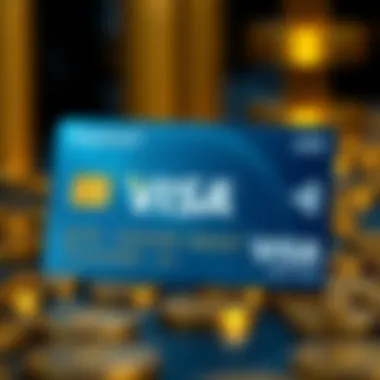Understanding the Visa USD Card and Cryptocurrency


Intro
In today’s ever-evolving financial landscape, the intersection of traditional finance and cryptocurrency continues to grow, capturing the interest of various stakeholders. One of the intriguing tools facilitating this transition is the Visa USD Card. This card acts as a bridge, allowing users to link their cryptocurrency holdings with standard banking functionalities.
As the crypto market fluctuates, understanding how this card operates can provide clarity for marketers, investors, tech professionals, students, and analysts alike. By examining its features, benefits, and the broader implications within the world of cryptocurrency, we can shed light on what this card means for both casual users and serious investors.
From security measures to its impact on transaction processes, the Visa USD Card opens a door to a multitude of possibilities. So, let’s dive into the core concepts surrounding cryptocurrency to better grasp how this card interacts within this dynamic ecosystem.
Key Concepts in Cryptocurrency
Definition and Importance
Cryptocurrency, at its core, is a digital or virtual currency designed to work as a medium of exchange. It uses cryptography for security, making it hard to counterfeit or double-spend. The importance of cryptocurrency goes beyond mere transactions: it stands as a sign of innovation and a fundamental shift in how we think about money and value.
In recent years, adoption of cryptocurrencies such as Bitcoin and Ethereum has surged significantly. People are not just seeing digital currencies as investments, but also as potential for everyday transactions. This shift forms part of a larger narrative about decentralization, enabling users to take control of their finances without traditional intermediaries like banks.
Blockchain Technology Overview
At the heart of most cryptocurrencies is blockchain technology, a decentralized ledger that records all transactions across a network of computers. This structure provides high levels of transparency and security, which can significantly reduce the risk of fraud.
- Transparency: Each transaction is publicly available on the blockchain, making it easier to track and verify.
- Immutability: Once a transaction is added, it cannot be altered or deleted, ensuring data integrity.
- Decentralization: Unlike traditional banking systems, blockchain operates on a distributed network, reducing single points of failure.
Understanding blockchain allows for the recognition of the foundational technology that supports not only cryptocurrencies but also the Visa USD Card. This card can essentially utilize the advantages presented by blockchain to enhance transaction efficiency and security.
Trends and Innovations
Emerging Cryptocurrencies
As the market matures, numerous new cryptocurrencies continue to emerge, each with unique functions and features. For example, stablecoins such as Tether and USDC aim to offer stability by pegging their value to traditional fiat currencies, like the US dollar. Other cryptocurrencies aim to facilitate specific use cases such as smart contracts and decentralized finance (DeFi).
Technological Advancements in Crypto
Innovation is rampant in the cryptocurrency sector. From enhanced security protocols to the creation of non-fungible tokens (NFTs), these advancements are redefining the financial landscape. For individuals using the Visa USD Card, these innovations mean greater flexibility in managing both fiat and crypto assets. As transactions evolve, the Visa USD Card fits naturally into this realm by bridging traditional banking with digital currency features.
"The Visa USD Card not only provides ease of use but paves the way for integrating digital currencies into everyday transactions."
Prelims to Visa USD Card
In a financial landscape that is constantly shifting, it's vital to grasp the role of various payment methods, especially the Visa USD Card. This article examines the significance of this card, particularly in the context of cryptocurrency. The Visa USD Card emerges as a bridge between traditional finance and the rapidly expanding world of digital currencies. By highlighting its features, usage, and how it fits into the broader financial ecosystem, we aim to provide readers with the insights they need.
Definition and Overview
The Visa USD Card is a prepaid card designed to operate within the U.S. dollar system. It allows users to load funds onto the card, which can then be used for purchases anywhere Visa is accepted. Unlike traditional debit or credit cards linked to bank accounts, the Visa USD Card functions as a separate entity, emphasizing secure transactions without direct access to personal banking information. This feature alone has considerable appeal, particularly among users who prioritize privacy and security.
Some key aspects include:
- Prepaid Nature: Users must load the card with funds before use, avoiding overspending or debt accumulation.
- Expense Control: Ideal for budgeting as users can only spend what is loaded on the card, making it a practical tool for financial management.
- Accessibility: It can be obtained without the need for a bank account, expanding access to those who might be underserved by traditional banking systems.
Historical Context
The concept of prepaid cards isn't new; however, their integration into the digital finance space marks a significant evolution. The origins can be traced back to the early 2000s when the popularity of prepaid debit cards began to grow. These cards were initially seen as a means of providing financial services to individuals without access to conventional banking. As technology advanced, the landscape changed dramatically with the emergence of cryptocurrencies, paving the way for products like the Visa USD Card.
In recent years, the volatility of cryptocurrencies and the need for fluidity in transactions have fostered a demand for payment methods that can safely navigate these waters. The Visa USD Card position itself in the market as both a stabilizing force and a facilitator of cryptocurrency transactions. This historical evolution showcases its relevance and potential to improve transactional ease, whether through traditional purchases or digital investments.
Understanding the historical context of the Visa USD Card helps underscore its transformative role in today’s economy, particularly when interfacing with cryptocurrency.
As we delve deeper into other sections, we will explore the various functionalities that the Visa USD Card offers, how it operates within the cryptocurrency space, and the implications of its use for both casual users and crypto enthusiasts alike.
Functionality of the Visa USD Card
The Visa USD Card is not just a plastic card; it serves as a bridge between traditional banking systems and the expanding world of cryptocurrencies. Understanding its functionality is crucial for anyone looking to navigate the complexities of modern finance and digital currencies. This section will break down the card's issuance process, delve into its transaction mechanism, and explore how it operates in both online and offline contexts.
Card Issuance Process
The journey of obtaining a Visa USD Card begins with a relatively straightforward application process. Applicants usually fill out an online form, providing personal details and proof of identity. Once submitted, the application is assessed, and if all checks are clear, the card is issued. This process typically takes a few days to a couple of weeks, depending on the issuer’s policies.
A unique aspect of this card is its compatibility with multiple wallets, particularly those connected to cryptocurrencies. Many users can link their Visa USD Card to wallets like Coinbase or Binance, facilitating a seamless transition between their crypto holdings and traditional funds. It’s important to note that not all crypto wallets support this integration, so verifying compatibility beforehand can save users a lot of headaches.
The card is directly tied to the user’s bank account or crypto balance, allowing for real-time access to funds for transactions. Essentially, it acts as a digital companion to users’ fiat currencies, enabling immediate access to funds when needed.


Transaction Mechanism
Understanding how transactions are processed with the Visa USD Card is pivotal for users who are keen on making quick and effective payments. Once the card is linked to a specific bank account or digital wallet, the card becomes a powerful tool for purchasing goods and services both in-store and online.
When a user swipes their card at a point of sale or enters their details online, the transaction goes through several steps:
- Authorization: The merchant sends a request to the card issuer for authorization of funds.
- Verification: The card issuer verifies if funds are available in the associated account. For crypto-linked cards, this step may also check for sufficient crypto balance.
- Completion: Upon successful verification, the transaction is completed, and funds are deducted instantly.
This process happens in the blink of an eye, highlighting the efficiency of electronic payment systems today. While spending via traditional cards often involves a slight delay due to batch processing, using the Visa USD Card linked to crypto can enhance speed, benefiting traders and consumers alike.
Online and Offline Use
In our increasingly digital world, the Visa USD Card shines in its versatility. Online, it can be used for e-commerce purchases—from buying gadgets on Amazon to trading on cryptocurrency exchanges. As e-commerce continues to expand, having a card that blends traditional and digital currencies is invaluable.
- Online Benefits: For those engaging in cryptocurrency trading, using the Visa USD Card means users can transfer their crypto holdings to fiat money and spend it with ease. This is especially beneficial for crypto traders, as it bypasses the often complex processes of converting crypto to cash via exchanges.
On the flip side, the card also serves its purpose offline, allowing users to make purchases in physical stores, much like any regular debit card. Many retailers and restaurants accept Visa cards, and this broad acceptance is a significant advantage. Moreover, some cards offer additional perks like discounts and rewards points for certain purchases.
The dual usability—both online and offline—positions the Visa USD Card as a comprehensive financial tool. Its functionality caters to a variety of settings, thus appealing to a diverse user base from tech-savvy traders to everyday shoppers.
The Visa USD Card exemplifies the merging of traditional finance and cryptocurrency, serving as a valuable asset for users navigating these two worlds.
Impact on Cryptocurrency Transactions
The Visa USD Card functions as a bridge between traditional financial transactions and the burgeoning world of cryptocurrencies. Its significance in cryptocurrency transactions cannot be overstated due to several unique features that meet the needs of both novice users and seasoned traders. By integrating this card into the cryptocurrency ecosystem, users can enjoy a smoother and more diversified financial experience.
Purchasing Cryptocurrencies
Purchasing cryptocurrencies using a Visa USD Card is a relatively straightforward process. Users can directly buy digital assets with their card, making the entry into the crypto market much easier than ever before. The whole procedure allows for instant purchases, which is a far cry from traditional methods that might require lengthy bank transfers or cumbersome verification processes. With the Visa USD Card, transactions can be authorized in a matter of minutes. This immediacy is particularly important for traders seeking to capitalize on the volatile nature of cryptocurrency prices.
Moreover, using this card comes with the added benefit of liquidity. Many users may find themselves in situations where they want to execute their buy orders without delay. The card allows them to take action promptly, potentially positioning them for favorable price movements. With Visa’s extensive reach, this ability to purchase cryptocurrencies instantly and seamlessly can transform the trading strategies of many enthusiasts.
Crypto Exchange Integration
The integration of the Visa USD Card with various cryptocurrency exchanges marks another significant milestone for users. More and more crypto exchanges are starting to accept payments via Visa cards, creating a seamless link between fiat currencies and digital currencies. This integration means that users can fund their trading accounts directly from their Visa USD Card, eliminating the need for multiple transfers and intermediaries.
This not only saves time but enhances the overall trading experience, especially for those who prefer quick transactions. A critical point to note here is the importance of ensuring that the exchanges you choose support Visa USD Card transactions. Not all platforms enable this functionality, so users should do their homework and opt for reputable exchanges that guarantee smooth processing.
"The merging of traditional finance tools like the Visa USD Card with cryptocurrency platforms signifies a pivotal shift in how financial transactions are processed, fostering easier access to digital currencies."
Benefits for Crypto Traders
Using the Visa USD Card for cryptocurrency transactions offers several specific benefits for traders:
- Instant Transactions: Traders can execute trades without waiting for traditional banking systems to process transfers.
- Global Acceptance: Because Visa is a widely recognized name, the card offers greater accessibility for traders across the globe, from New York to Sydney.
- Rewards Programs: Some Visa USD Cards may offer cashback or rewards for transactions, providing an added incentive for users engaging in crypto trading.
- Expense Tracking: By linking the Visa USD Card to budgeting tools, traders can keep an eye on their spending habits, which is especially important in a volatile market like cryptocurrencies.
By leveraging these advantages, traders can improve their efficiency and gain an edge in the fast-paced cryptocurrency market.
Advantages of the Visa USD Card
The Visa USD Card offers a range of advantages that make it a noteworthy player in the financial landscape, particularly in relation to cryptocurrency. Understanding these benefits enhances grasp of how this card not only fits within traditional banking but also dovetails with digital currencies.
Global Acceptance
One of the standout features of the Visa USD Card is its global acceptance. Unlike many crypto-specific cards, which may only be useful in certain regions or platforms, the Visa USD Card is recognized worldwide. This means users can utilize their card for transactions in multiple countries and currencies, making it especially valuable for frequent travelers and online shoppers alike.
Imagine standing in a bustling market in Tokyo or a quaint café in Paris, only to realize your online payment method won’t work. The Visa USD Card, however, made possible by its widespread acceptance, allows users to sidestep such issues. This feature enables a seamless experience—customers can purchase goods and services directly with the underlying stability of USD while engaging with local vendors.
"A currency that works anywhere, is often a traveler’s best ally."
Moreover, this adoption extends to a myriad of digital platforms and websites. So, whether one is investing in cryptocurrencies on prominent exchanges or simply buying everyday items through e-commerce sites like Amazon or eBay, having a Visa USD Card eases these transactions, allowing for effortless spending.
Seamless Transactions
Another compelling feature of the Visa USD Card is its ability to facilitate seamless transactions. From placing an order online to paying for coffee, the card takes the hassle out of financial interactions. This simplicity is a boon for both merchants and users. The technology behind the Visa USD Card streamlines the payment process. Users can just tap their card or enter their details without the cumbersome steps traditionally associated with transactions, especially when converting cryptocurrency to fiat.
For investors and traders in the crypto space, this swift transaction capability is invaluable. Many platforms allow users to instantly swap digital assets for USD or practical purchases, translating crypto holdings into immediate spending power. It sidesteps the long waiting times often seen when withdrawing from exchanges, keeping funds fluid and accessible at a moment’s notice.
Enhanced Security Features
Security cannot be overlooked when discussing the advantages of the Visa USD Card. In today’s landscape, where fraud and data breaches are daily headlines, this card employs cutting-edge technology to protect user transactions. Features may include chip and PIN technology, which adds a layer of security against unauthorized use.


Additionally, when engaging with cryptocurrencies—known for their volatility and specific risks—having a Visa USD Card mitigates certain security concerns. Many cards provide built-in fraud protection, notifying users of suspicious activity almost instantaneously. This sense of security can give users peace of mind when converting or using cryptocurrency, making the Visa USD Card an appealing option.
Challenges and Limitations
Navigating the landscape of the Visa USD Card within cryptocurrency brings not only opportunities but also certain hurdles. Recognizing these challenges is essential for users who wish to make full use of this financial tool. Each limitation poses its own set of considerations, affecting functions such as the fees involved, regulatory conditions that come into play, and the harmony between the card and various crypto wallets.
Fees and Charges
Using a Visa USD Card isn't entirely free of cost. The fees and charges associated with this card can vary widely, depending on the issuing bank or financial institution. Typically, you might encounter:
- Transaction Fees: For every purchase or crypto conversion, a fee might apply, which could be a flat rate or a percentage of the transaction volume.
- Foreign Currency Charges: While traveling, if you use your card outside the USD zone, you could be looking at additional conversion fees that can sneak up on you.
- Maintenance Fees: Some providers might charge a monthly or annual fee just to keep your card active.
These charges can nip at your wallet and fluctuate based on how you intend to utilize the card. Being aware of the fine print before signing on the dotted line can save you from unpleasant surprises later.
Regulatory Constraints
The landscape of cryptocurrency regulations continues to morph, and it can put a damper on the otherwise seamless use of the Visa USD Card. Different countries have different rules governing how cryptocurrency interacts with traditional banking systems. This leads to a patchwork of guidelines that can complicate matters. Consider the following:
- Compliance Requirements: Financial institutions may be required to report transactions to government entities, affecting user privacy.
- Changing Laws: Fluctuating regulations can result in abrupt changes, affecting how and when users can leverage their Visa USD Cards for crypto interactions.
- Limits on Transactions: Some jurisdictions might impose limitations on the amount of cryptocurrency that can be purchased or converted in a specified timeframe, which can feel like a straightjacket on trading strategies.
Being cognizant of these regulatory factors is critical. Not only can it guide how you engage with your card, but it can also shape your overall investment journey in the crypto space.
Compatibility Issues with Crypto Wallets
The functioning of a Visa USD Card usually rests on its compatibility with various crypto wallets. Not every wallet is built equal, so some users might run into more hurdles than they anticipated. A few considerations to bear in mind include:
- Limited Wallet Support: Some popular wallets may not support direct integration with the Visa USD Card, limiting options for easy transfers.
- Transaction Delays: When the compatibility isn’t solid, transactions might not process as quickly as needed, which can create headaches during trading or urgent purchases.
- Security Layers: Different wallets come with their own security measures, which might not align well with the card’s specs, adding additional layers of complexity to transactions.
In short, ensuring your preferred crypto wallet works harmoniously with the Visa USD card is pivotal. Users must evaluate their choices carefully to avoid lag or frustration in transactions.
"Understanding the challenges and limitations of the Visa USD Card within the crypto realm is crucial for maximizing its potential while safeguarding your investments."
As the demand for crypto continues to rise, being prepared for such challenges will help you maintain a competitive edge.
Security Aspects
In the world of digital finance, particularly when intertwining traditional banking with the burgeoning cryptocurrency space, security takes center stage. The Visa USD Card is no exception; understanding its security aspects is crucial for users who wish to protect their assets and personal information while engaging with this innovative financial tool. This section delves deep into two fundamental components: Fraud Prevention Mechanisms and User Privacy Considerations. Each plays a pivotal role in fostering trust and confidence among crypto enthusiasts who are cautious about the digital landscape's inherent risks.
Fraud Prevention Mechanisms
Fraud in payment systems can be as elusive as smoke in the wind. The Visa USD Card implements various measures to ensure that users' funds and personal information remain under lock and key. One standout feature is its real-time transaction monitoring. This system tracks every purchase and can flag suspicious activities, such as unusual spending patterns or transaction anomalies. For instance, if the cardholder typically makes small purchases but suddenly attempts to buy high-value items, the system might temporarily freeze the account.
Another layer of security comes from chip technology. Unlike magnetic stripe cards, chip-enabled cards generate a unique transaction code for each purchase. This means that even if someone intercepts your information, they’ll be left holding a useless code. It’s like trying to unlock a door with an old key – it simply won’t work.
Furthermore, the Visa USD Card uses multi-factor authentication (MFA). Users may be required to verify their identity through methods such as fingerprint scans or one-time passwords sent to their mobile device. This added step significantly decreases the chances of unauthorized access.
"Fraud prevention is not just about stopping the bad guys; it's about empowering users with tools to protect themselves."
All these mechanisms create a robust framework that not only mitigates risks but also instills a sense of safety among users, crucial for those engaging with cryptocurrencies.
User Privacy Considerations
Privacy in the digital age is akin to gold; it's valuable yet frequently overlooked. The Visa USD Card recognizes this and incorporates features that prioritize user privacy. One crucial aspect is the minimal sharing of personal information during transactions. When using the card, your sensitive data is often masked or encrypted, ensuring that merchants receive only what's necessary for processing payments.
Moreover, several privacy-focused policies come into play. For instance, cardholders have rights regarding their data and can opt out of certain tracking practices that companies often employ. Users can inquire about what data is collected and how it is utilized – the power lies in the cardholder's hands.
In terms of cryptocurrency, where anonymity is often a significant allure, the card offers a balanced approach. It allows for transactions without revealing too much personal detail, making it a compatible choice for those who value discretion in their financial dealings.
In summary, as the financial landscape evolves, understanding how the Visa USD Card addresses security and privacy is paramount. These aspects not only enhance user confidence but also encourage broader adoption of the card, bridging the gap between traditional finance and the innovative world of cryptocurrency.
Comparative Analysis
In the financial world, making informed choices often calls for a careful side-by-side evaluation of options available to consumers. Thus, conducting a comparative analysis of the Visa USD Card against both traditional debit cards and crypto cards is pivotal for understanding its role in today’s evolving payment landscape.
Visa USD Card vs. Traditional Debit Cards
The Visa USD Card stands in stark contrast to traditional debit cards in a few key ways, despite both serving the primary function of facilitating transactions. Traditional debit cards, issued by banks, link directly to a user’s bank account, enabling them to spend the funds they own. On the other hand, the Visa USD Card often operates in a more flexible manner. It may provide accessibility to both banked and unbanked populations, opening doors for transactions in ways typical banking services might not.
Some notable distinctions include:
- Funding Sources: For traditional debit cards, users typically have a single source of funds—a bank account. In contrast, the Visa USD Card may support a broader range of funding sources, including cryptocurrency and digital wallets.
- Global Reach: Traditional debit cards often face geographical restrictions based on the issuing bank. Meanwhile, Visa USD Card users enjoy global acceptance, making international transactions seamless. This is especially beneficial for frequent travelers or online shoppers who transact across borders.
- Rewards and Benefits: While many debit cards offer limited rewards programs, the Visa USD Card might provide enhanced cashback or points systems as incentives for users. This can make day-to-day spending more fruitful for consumers.


*The Visa USD Card, therefore, offers a blend of traditional capabilities with additional flexibility that may appeal to those seeking more than just a basic banking solution.
Visa USD Card vs. Crypto Cards
When comparing the Visa USD Card with dedicated crypto cards, it’s essential to evaluate their features, benefits, and overall user experiences. Crypto cards, like those from Coinbase or Binance, allow users to spend their cryptocurrency directly by converting it into fiat currency at the point of transaction. In contrast, the Visa USD Card takes on a different approach.
Consider the following:
- Ease of Use: Visa USD Cards are often easier for the layperson to comprehend than crypto cards, particularly for individuals unfamiliar with cryptocurrency. The familiar structure of links to traditional banking makes the Visa USD Card an attractive option for those hesitant to delve into the complexities of crypto.
- Transaction Fees: Crypto cards frequently charge conversion fees, which can add up for regular users. Conversely, the Visa USD Card might present a more predictable fee structure tied to transactions, which can promote better budgeting.
- Stability: One of the long-standing issues with cryptocurrency can be volatility. The Visa USD Card, denominated in USD, offers a stable value in transactions, reducing the risk of losing money on price fluctuations that are common in the crypto market.
"In essence, while crypto cards cater to enthusiasts eager to immerse in digital economies, the Visa USD Card serves as a bridge, easing transitions between traditional and digital currencies."
Both comparisons highlight the growing interconnectivity between traditional finance and cryptocurrency, showcasing how the Visa USD Card is strategically positioned to meet diverse user needs. Its unique features, when juxtaposed against debit and crypto cards, signify its value in the modern financial ecosystem.
Use Cases in Different Scenarios
The Visa USD Card serves as a convenient bridge between traditional financial systems and the burgeoning world of cryptocurrency. Emphasizing its use cases offers impressive insights into how this card can be applied across various scenarios. It's not just about spending; it’s also about enhancing the overall experience for users in different segments of life.
Travel and International Transactions
Traveling abroad involves more than just packing your bags. It comes with the challenge of managing multiple currencies and dealing with fluctuating exchange rates. The Visa USD Card becomes a handy ally in such situations. With its global acceptance and easy access to funds, users can conduct transactions in multiple currencies without the hassle of converting cash.
Imagine landing in Paris, the Eiffel Tower glistening under the sun, and you’re free to swipe your Visa USD Card at a local café without worrying about hefty exchange fees. What’s more, the card is directly linked to your cryptocurrency holdings, allowing for seamless conversion at market rates when you're away from home. This flexibility enhances the travel experience significantly.
"Traveling is about experiencing new cultures. With the Visa USD Card, it becomes easier to dive into the local economy without a second thought."
The security features of the card add an extra layer of peace of mind, especially when making international purchases. Unlike carrying cash, which can be lost or stolen, the Visa USD Card can be easily monitored and controlled through mobile applications and online platforms. If something feels off, you can freeze the card in seconds.
E-commerce Purchases
In today’s digital landscape, online shopping is more prevalent than ever. From buying everyday essentials to snagging that new gadget, the ability to use a Visa USD Card can make or break the experience. For users of cryptocurrencies, this card acts as a vital link, facilitating transactions that might otherwise be hampered by traditional banking hurdles.
E-commerce platforms often cater to a wide array of payment methods. With the Visa USD Card, cryptocurrency holders can purchase goods directly without the lengthy process of converting and transferring their crypto assets. This instant usability means that if you find a must-have item on a website, you can snag it right away, avoiding the fear of out-of-stock notifications.
Furthermore, enhanced transaction speed paired with minimal fees ensures that users get maximum value for their purchases. This efficiency is especially beneficial during sales or time-sensitive events where every second counts.
In summary, whether traversing foreign lands or browsing through online storefronts, the Visa USD Card stands out as a versatile tool for enhancing the purchasing journey. Its multifaceted applications illustrate not only the merging of the old with the new but also herald a future where cryptocurrency and traditional finance can coexist seamlessly.
Future Prospects
The realm of the Visa USD Card intertwined with cryptocurrency is still unfolding. Understanding the future prospects of this integration holds significant importance not only for marketers or investors, but also for daily users navigating this evolving landscape. The rapid progression of financial technologies, coupled with the increasing adoption of cryptocurrencies, lays a foundation for exciting opportunities ahead. This section will delve into key elements, advantages, and considerations that shape the future of the Visa USD Card in the world of digital currencies.
Market Trends and Predictions
The market for cryptocurrencies continues to be a robust, volatile space, characterized by dynamic shifts. Experts predict several trends that could shape the relevance of the Visa USD Card in the near future:
- Increased Adoption of Cryptocurrencies: As more individuals begin to engage with cryptocurrencies in their daily transactions, the demand for seamless interaction between traditional finance and digital assets rises. The Visa USD Card stands to gain prominence as a bridge, allowing users to convert and spend their crypto holdings effortlessly.
- Regulatory Developments: Laws and regulations are continually evolving. This could pave the way for better protection of users engaging with cryptocurrencies, particularly through established financial instruments like the Visa USD Card. A clearer regulatory framework might enhance user confidence, drawing more people into the fold.
- Shift Towards Decentralized Finance: Decentralized finance (DeFi) is gaining traction, with users finding innovative ways to manage their assets outside of traditional banks. The Visa USD Card might adapt to facilitate transactions across DeFi platforms, adding value by simplifying access to these services.
"As institutions adopt digital currencies, and more users interlink their financial activities with crypto, products like the Visa USD Card will likely become essential tools of everyday finance." - Financial Analyst Insight 2023
These trends suggest that the next few years could see a significant rise in partnerships and innovations centering on the Visa USD Card.
Integration with Emerging Technologies
The technological landscape is rapidly advancing, and so are methods of processing transactions. The Visa USD Card may be at the forefront of these innovations, driven by integration with various emerging technologies:
- Blockchain Technology: The backbone of many cryptocurrencies, blockchain ensures secure and transparent transactions. Integrating blockchain solutions within the Visa USD Card system could enhance reliability and provide users with the transparency they desire. This could help mitigate issues related to fraud and identity theft.
- Smart Contracts: The potential for the Visa USD Card to utilize smart contracts could automate various transactions, from purchases to the management of funds. This could not only create more efficient systems but also introduce new features like conditional payments that are executed automatically under certain circumstances.
- Artificial Intelligence: AI may play a role in refining the user experience by offering tailored insights and managing risks. By analyzing transaction patterns, AI can help optimize the benefits of using the Visa USD Card, predicting areas of improvement and alerting users about potential security issues.
Finale
The conclusion serves a vital role in encapsulating the essence and understanding of the Visa USD Card within the cryptocurrency landscape. Summing up the main points discussed throughout the article, one can appreciate the card's potential to bridge the gap between traditional finance and the burgeoning world of digital currencies.
Summarizing Key Insights
As we reflect on the powerful impact of the Visa USD Card, several key insights emerge:
- Versatile Functionality: The card allows users to easily transact with both fiat currencies and cryptocurrencies, catering to an increasingly diversified pool of consumers.
- Security Measures: Enhanced security features protect user transactions, making it a safer choice for both novice and veteran crypto enthusiasts. This aspect cannot be overstated, especially considering the precarious nature of digital currencies today.
- Global Reach: The card’s worldwide acceptance provides a significant advantage when making cross-border transactions. For crypto traders and investors, this translates to simplicity and ease, facilitating instant access to markets without the usual hassles.
- Potential Drawbacks: While the benefits are substantial, it is necessary to also acknowledge the limitations, such as fees and regulatory hurdles that could complicate its usage.
This synthesis not only assists readers in comprehending how the Visa USD Card integrates into their financial practices but also encourages consumers to weigh the pros and cons thoughtfully before adoption.
Future Research Directions
As cryptocurrencies continue to evolve, the need for comprehensive research will only increase. It is crucial for scholars, developers, and consumers alike to consider further inquiries into the following areas:
- Innovative Payment Solutions: Investigation into how new financial technologies can complement the Visa USD Card and enhance user experience.
- Regulatory Impact Studies: Given the continuously changing nature of laws regarding cryptocurrencies, research should focus on how regulatory shifts impact the use of such payment cards.
- User Experience Analysis: Collecting user feedback on the Visa USD Card's functionality, security features, and ease of use to identify improvements.
- Market Dynamics: A deep dive into how the Visa USD Card influences trading behavior and market prices in cryptocurrency exchanges.
Continued exploration in these avenues will undoubtedly cultivate a more nuanced understanding of the intersection of traditional finance and the crypto world, ultimately guiding future innovations and improvements in payment solutions like the Visa USD Card.















